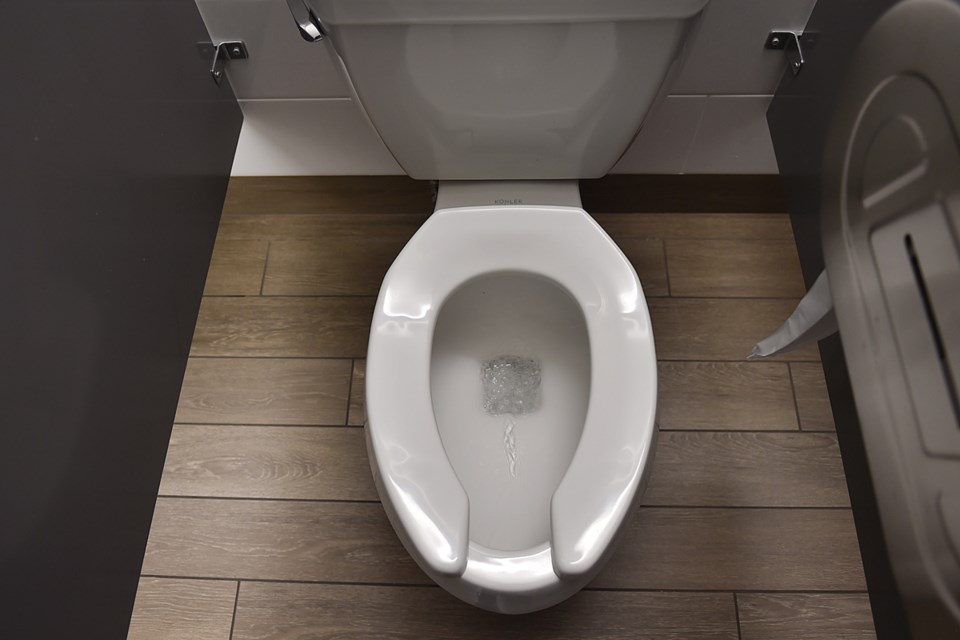The word itself makes me uncomfortable – “unflushables.”
Yuck.
Yes, I’m going there, writing about stuff you’re not supposed to flush down the toilet. No, I’m not one of those adults still amused by potty humour. Yes, I could write about something else.
But when I came across a report in the Sept. 14 agenda of Metro Vancouver’s utilities committee (Man, what has my life become?), I couldn’t resist quoting and paraphrasing some of what I read.
Before I do that, I will first tell you that Metro �鶹��ýӳ��spent $200,000 on a campaign this year to keep “seven priority items” out of the toilet. They are, in no particular order: wipes, paper towels, dental floss, hair, tampons and applicators, condoms and medications.
“Survey results show that most people are aware of how to correctly dispose of the items addressed in the campaign, but that many still flush these items at least occasionally for reasons of convenience, hygiene or the perception that small amounts don’t cause clogs,” the report said. “Reports from outreach teams indicate many people understand that wipes should not be flushed, but awareness for hair and dental floss are generally low.”
Described as “an information and behaviour change campaign,” it focused on reaching people in bathrooms and maintaining a light and humorous tone, approaches proven to be effective in the 2016 wipes campaign – that’s wipes as in baby wipes, personal hygiene wipes and cleaning wipes.
Humour is an element of the campaign but the seriousness of the message couldn’t be more, well, serious: Unflushables, many of which don’t break down, cause clogs, which can be costly to remove and can lead to raw sewage overflows into the environment.
And disposing of medications, particularly prescription drugs, down the toilet is also not a good thing. A pharmacy will take these off your hands.
Larina Lopez, Metro’s division manager of communications, said costs to maintain and fix the region’s pumping equipment and clogged sewers continue to mount each year.
“We’ve estimated at least $100,000 annually to de-clog regional pump stations, but then hundreds of thousands on top of that to replace damaged equipment as a result of items going down the sewage system that shouldn’t be,” she said, noting it cost about $950,000 to replace a pipe in Richmond a few years go. “In that case specifically, it was based on a lot of people putting grease and oils down their drains. So when there’s a combination of people putting grease and oil down their drains, and then putting these other items down their toilet, all of it that gets combined and ends up coagulating together and things get blocked in our sewer system.”
The strangest thing recovered in a pipe?
“Fortunately, I am not one of those people having to deal with that,” she said. “I mean, if you dream it up, I’m sure they’ve seen it. I don’t want to quote anything, but I’ve heard some pretty bad horror stories.”
Take the United Kingdom, for example, where a report in The Guardian newspaper said a lump of congealed fat and household waste – known as a fatberg -- was 40 metres long and so heavy that it broke a Chelsea sewer. It cost $400,000 in UK dollars to fix.
The main elements of Metro’s campaign were:
• posters in washrooms in community facilities, movie theatres, fitness centres and restaurants and bars.
• digital posters in elevator screens in residential buildings.
• animated videos on medications, hair and wipes.
• toilet paper with “campaign messaging” handed out at community events.
• digital and social media, including YouTube ads, promoted Facebook & Twitter and Google banners, and social media promotion (via Twitter) by London Drugs.
• a campaign website.
A study showed the campaign generally performed well with more than 70 per cent of those who saw the campaign materials saying they would be less likely to flush the unflushables highlighted in the campaign.
But as Lopez pointed out, that means 30 per cent of people continue to flush anything and everything down the toilet, or dump grease and oil into drains. She said Metro will continue its campaign in 2018, with a budget to be set in November.
“We still have some good education to do around this topic,” Lopez said. “Just because you can flush it, doesn’t mean you should.”
As the campaign’s website made clear: “The only things that are OK to flush down the toilet are pee, poo and toilet paper.” Yes, I just wrote the p-words. Can’t recall ever doing that. All, of course, in the name of educating the guilty flushers.
@Howellings



